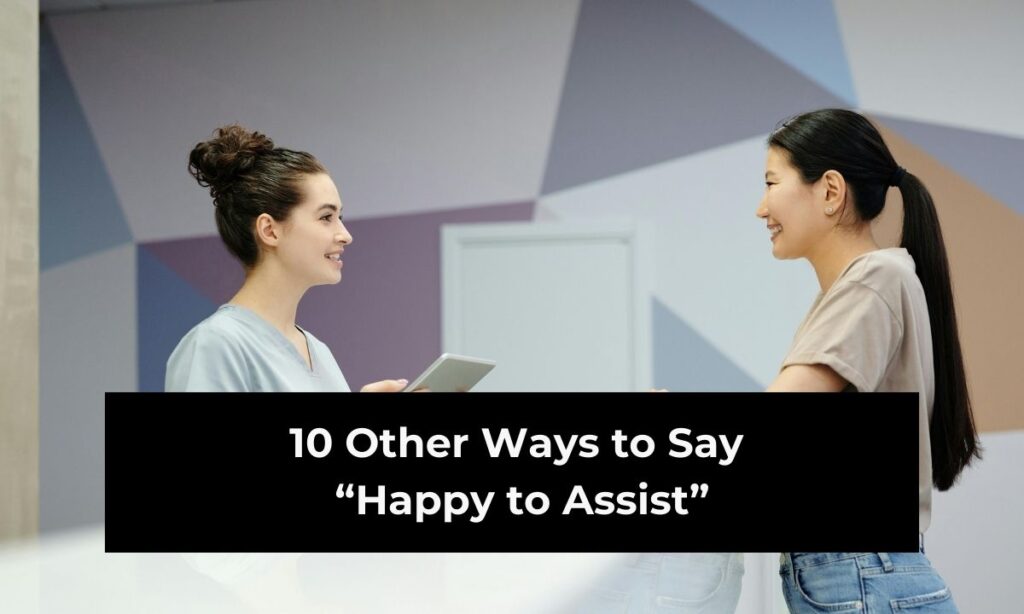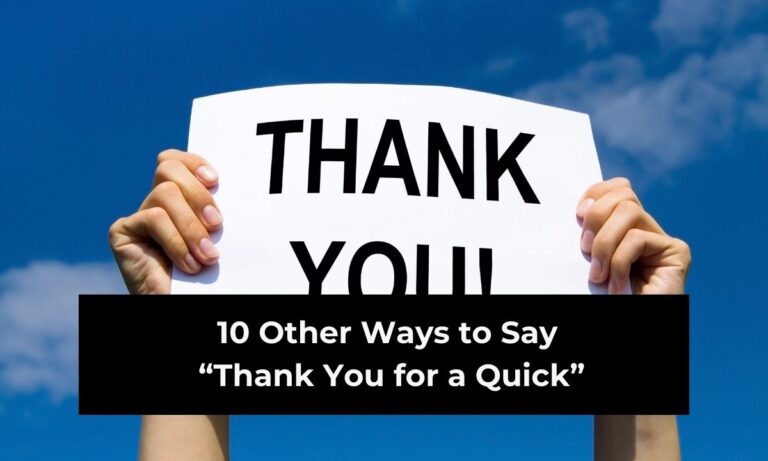Have you ever caught yourself repeating the same phrase—like “Happy to assist”—in professional emails, customer support chats, or even casual conversations? While it’s a polite and positive response, using it too often can start to feel a little robotic. And if you’re looking to build stronger relationships, whether with colleagues, clients, or friends, variety in your language can make a big difference.
Think about it: every time you respond with warmth and enthusiasm, you not only acknowledge someone’s request but also create a more memorable interaction. Your choice of words shows your personality, sets the tone for your communication, and can even influence how others perceive your willingness to help.
That’s why having a collection of alternative phrases for “Happy to assist” is so valuable. Instead of defaulting to the same old line, you can adapt your response to suit different contexts. For example, a formal workplace setting might require polished wording, while a casual chat with a friend could benefit from something lighter and more relaxed.

In this article, we’ll explore 10 fresh, thoughtful, and professional alternatives to saying “Happy to assist.” Each option comes with examples and explanations, so you’ll know when and how to use them. By the end, you’ll feel more confident in your communication and ready to add a touch of variety to your daily interactions.
Must Read:
- Other Ways to Say “Happy to Announce”
- Other Ways to Say “Make a Difference”
- Other Ways to Say “Let’s Do This”
1. “Always Glad to Help”
This phrase emphasizes consistency and reliability. When you say “Always glad to help,” you show that your willingness isn’t limited to one situation—it’s an ongoing attitude. It’s perfect for workplace interactions, customer service roles, or even when helping a friend with advice.
Unlike “Happy to assist,” this version feels a bit warmer and more human. It signals that the other person can count on you not just this time, but in future situations too. For clients, this builds trust; for colleagues, it strengthens teamwork.
Example:
- “Thank you for your quick support.”
- “Of course, I’m always glad to help.”
You can use this phrase in both professional and personal conversations, and it works especially well when you want to leave the door open for ongoing collaboration.
2. “It’s My Pleasure”
Polished and professional, “It’s my pleasure” is a timeless way to replace “Happy to assist.” It carries a tone of respect and refinement, making it especially appropriate in business emails, hospitality settings, or formal customer interactions.
The phrase conveys more than willingness—it suggests that helping someone is enjoyable for you, not a burden. That subtle difference makes people feel genuinely valued.
Example:
- “Thanks so much for clarifying this!”
- “It’s my pleasure. Let me know if you need anything else.”
If you work in client-facing roles, such as sales or service, this phrase can make your responses sound polished and courteous without being stiff. It’s a phrase that communicates professionalism while still sounding approachable.
3. “I’m Here Anytime You Need”
This alternative offers reassurance and dependability. By saying “I’m here anytime you need,” you show long-term availability rather than just momentary help. It’s ideal for colleagues, teammates, or friends who may require your support again.
The phrase is more casual than “It’s my pleasure,” but it carries warmth and sincerity. It creates a sense of reliability and builds trust because it suggests that you’re not just available in the moment but also in the future.
Example:
- “Thanks for guiding me through this.”
- “No problem at all—I’m here anytime you need.”
This version is especially effective when you want to show ongoing support, such as mentoring, coaching, or building client relationships.
4. “Glad I Could Help Out”
“Glad I could help out” puts the focus on the outcome rather than the action itself. It’s casual, friendly, and often works better in less formal settings. It also conveys satisfaction—you’re happy that your assistance actually made a difference.
Unlike “Happy to assist,” this phrase feels conversational and approachable. It works particularly well in team environments or when talking with friends, where formal language isn’t necessary.
Example:
- “Your advice really solved the issue.”
- “I’m glad I could help out.”
This phrase makes your support feel genuine and effortless, rather than scripted. It helps create a more relaxed and authentic connection.
5. “Don’t Mention It”
If you want a lighthearted, modest way of saying “Happy to assist,” then “Don’t mention it” is a great option. It minimizes your effort in a friendly way, showing that helping wasn’t a big deal.
This phrase works best in casual conversations, especially when you want to downplay your role. It can make the other person feel more comfortable because you’re framing your assistance as something natural and easy.
Example:
- “Thanks again for stepping in!”
- “Don’t mention it. I was glad to do it.”
In professional settings, use this phrase carefully—it can feel too casual in very formal contexts. But in everyday interactions, it strikes the right balance of kindness and humility.
6. “Happy to Support”
“Happy to support” is a close cousin of “Happy to assist,” but with a slightly broader meaning. While “assist” implies helping with a task, “support” suggests emotional or ongoing backing.
This makes it especially powerful in team settings, where collaboration matters. By using this phrase, you’re not just offering short-term help—you’re signaling that you’re invested in someone’s success.
Example:
- “I appreciate your input on this project.”
- “Of course, I’m happy to support.”
This phrase works beautifully in workplaces where encouragement and cooperation are valued. It conveys positivity while reinforcing that you’re part of the bigger picture.
7. “It Was No Trouble at All”
Sometimes, people hesitate to ask for help because they don’t want to inconvenience you. Saying “It was no trouble at all” directly reassures them that their request didn’t bother you.
This phrase is empathetic and comforting. It reduces guilt or hesitation on the other person’s part, making them feel more comfortable reaching out again.
Example:
- “Thanks for staying late to explain this.”
- “It was no trouble at all. I’m glad we got it sorted.”
In professional settings, this phrase adds a human touch. It helps strengthen client or colleague relationships by making your assistance feel effortless.
8. “Always Here to Lend a Hand”
This phrase is warm, friendly, and supportive. Saying “Always here to lend a hand” suggests teamwork and camaraderie, making it ideal for casual work environments or community groups.
It carries a personal tone, and unlike “Happy to assist,” it feels less formal and more approachable. This makes it great for settings where you want to emphasize connection rather than professionalism.
Example:
- “Thanks for helping with the setup.”
- “No worries—I’m always here to lend a hand.”
This phrase works best when you want to highlight collaboration and show that you’re an approachable ally.
9. “I’m Just Glad Everything Worked Out”
This alternative focuses on results rather than effort. Saying “I’m just glad everything worked out” shifts the emphasis to the positive outcome, showing that you care about the resolution more than the credit.
This phrase adds warmth and empathy, as it highlights your concern for the other person’s situation. It’s great when helping someone through a challenge or when the solution was particularly important.
Example:
- “Thanks again for all the guidance.”
- “I’m just glad everything worked out in the end.”
It’s a thoughtful and caring way to close out a conversation, especially when the person was stressed or worried beforehand.
10. “Consider It Done”
Confident and proactive, “Consider it done” is a strong replacement for “Happy to assist.” It conveys certainty, efficiency, and a no-hassle attitude. This phrase is particularly powerful in professional settings where you want to show reliability.
By using this phrase, you communicate decisiveness and the ability to follow through quickly. It’s especially effective when responding to requests in the workplace, as it reassures others that their needs will be met without delay.
Example:
- “Can you help me finalize the report by tomorrow?”
- “Absolutely. Consider it done.”
This phrase leaves no doubt in the other person’s mind that they can rely on you to deliver.
Conclusion
Adding variety to your communication helps you sound more authentic, approachable, and professional. While “Happy to assist” is perfectly fine, having a set of alternatives allows you to match your response to the tone of the conversation. Whether you want to sound formal, casual, empathetic, or confident, the right phrase can elevate your interactions.
From polished options like “It’s my pleasure” to relaxed choices like “Don’t mention it,” you now have ten versatile phrases to use in place of “Happy to assist.” The next time someone thanks you, try choosing a response that fits the moment. You’ll find that not only does it make you stand out, but it also strengthens your personal and professional connections.
Communication is an art, and with a little creativity, your words can leave a lasting impression. So, the next time you’re tempted to say “Happy to assist,” pause and try one of these alternatives—you might be surprised at how much of a difference it makes.
FAQs
1. Is “Happy to assist” too formal for everyday use?
Not necessarily. It’s polite and professional, but in casual conversations, alternatives like “Glad I could help out” may sound more natural.
2. Which alternative works best in business emails?
“It’s my pleasure” and “Consider it done” are excellent for professional settings because they sound polished and reliable.
3. Can I use these alternatives in customer service roles?
Absolutely. Options like “Always glad to help” and “Happy to support” can make customer interactions feel more personal and engaging.
4. What’s the most casual option on the list?
“Don’t mention it” and “Glad I could help out” are the most relaxed and conversational phrases you can use.
5. How do I choose the right phrase for the situation?
Consider the tone of the interaction. Use formal alternatives in professional settings and casual ones when talking with friends, colleagues, or peers.





